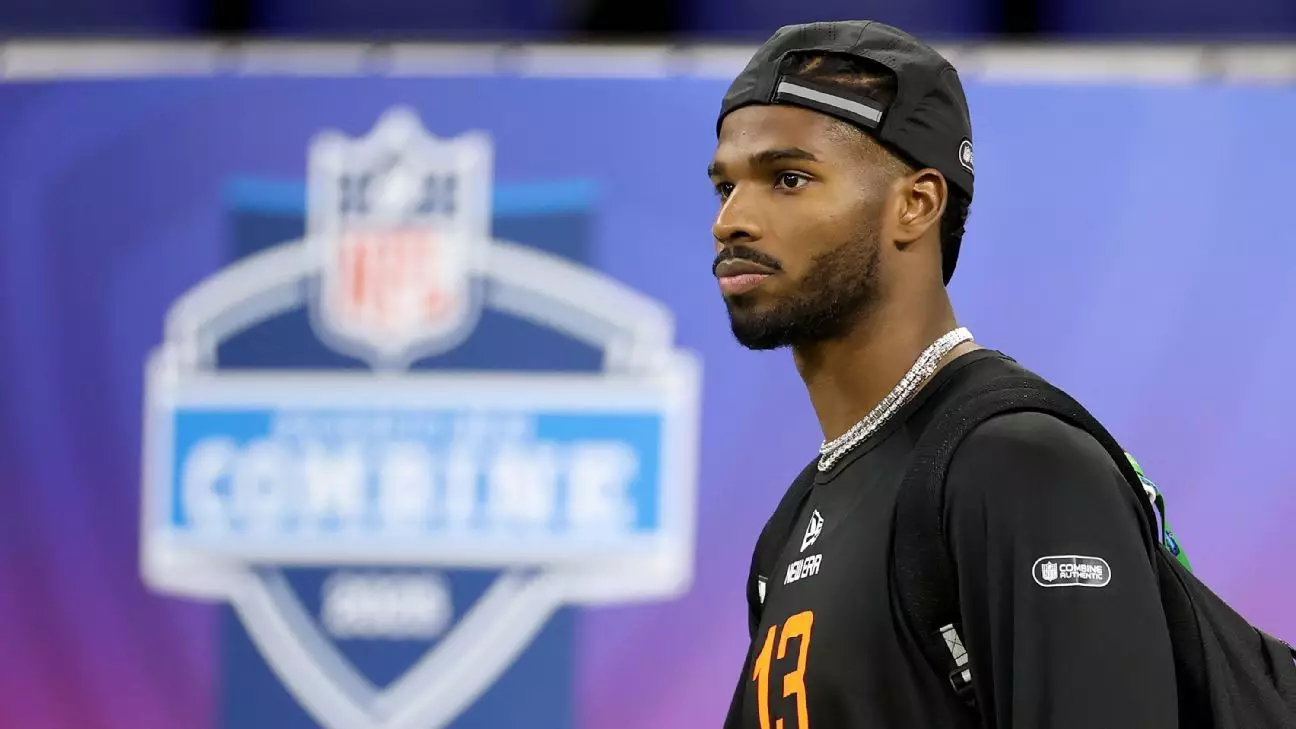Unlocking Mistakes The Unfortunate Prank Call Incident in the NFL Draft
Hey there, fellow food enthusiasts and sports fans! Today, we’re diving into a topic that’s a bit different from our usual culinary adventures but equally as juicy. It’s about an unforgettable moment that unfolded during the NFL draft—a time when dreams are made, and careers are launched. Imagine the excitement and anticipation of young athletes as they await their fate, only for it to be marred by a prank call. This is the story of Jax Ulbrich’s unfortunate prank that caused a stir in the world of professional sports.
The incident involved Jax Ulbrich, son of Atlanta Falcons’ defensive coordinator, who decided to impersonate New Orleans Saints general manager Mickey Loomis. His target? Shedeur Sanders, a promising quarterback prospect. Now, this wasn’t just any prank call—it was one that interrupted a pivotal moment in Sanders’ life. We’re talking about years of hard work and dedication on the line. The prank not only led to public apologies but also raised some serious questions about responsibility and maturity, especially when played out in such a public arena.
Key Takeaways
- The prank call incident highlights the fragility of privacy in today’s digital age.
- Jax Ulbrich’s actions underscore the importance of accountability and maturity.
- The incident serves as a reminder for the NFL to address prank culture more seriously.
The Overreach of a Young Adult’s Impulsivity
Let’s talk about impulsivity and how it can sometimes lead us astray. In his public apology, Jax Ulbrich labeled his actions as “completely inexcusable, embarrassing, and shameful.” While it’s commendable that he owned up to his mistake, it’s essential to remember the severity of his actions. At 21 years old, Jax is not a child anymore, and pulling such a prank during a significant event like the NFL draft shows a severe lack of judgment. This incident wasn’t just about him—it had repercussions for Shedeur Sanders and even rippled through the entire NFL community.

On the other side of this unfortunate tale is Shedeur Sanders, who handled the situation with remarkable grace. Instead of letting the prank derail his focus or cause public outrage, Sanders chose to downplay it. He said he wouldn’t “feed into negativity,” which speaks volumes about his maturity level. His approach not only diffused what could have been an escalating situation but also allowed him to maintain his concentration on his upcoming professional career. It’s a classic example of how poise and composure can be more powerful than retaliation.
Implications for NFL Culture and Conduct
This event also shines a light on the broader culture within the NFL regarding pranks and jokes gone wrong. Sports is often seen as a brotherhood—a place where camaraderie is highly valued. However, what’s meant as harmless fun can sometimes cross lines into recklessness if left unchecked. According to Sanders’ account and reports from other players who experienced similar pranks during draft season, it seems this behavior might be more widespread than initially thought. The question arises: has this become an unwanted tradition?
The response from the Atlanta Falcons was swift—they condemned Ulbrich’s behavior outright while stressing their commitment to reviewing internal protocols regarding privacy and professionalism among players’ families and staff members alike. But one must wonder if any measures put in place will truly suffice when light-heartedness mingles with high stakes like those witnessed during draft day emotions running high already without adding unnecessary distractions into mix too!
Looking Ahead Lessons Learned and Moving Forward
In reflection upon these events (and hopefully learning opportunities!), many hope they serve as rare missteps rather than common occurrences moving forward within sport leagues around world! Harnessing moments like these provides valuable lessons alongside calls-to-action needed ensure similar incidents don’t repeat themselves future times—especially given delicate balance between personal privacy versus public celebration success stories told through athlete journeys en route towards achieving greatness.

It can be hoped that Jax Ulbrich’s regrettable prank call serves as a wake-up call—not just for him but everyone involved in league integrity respect maturity must guide interactions during most significant transitions athlete’s life! Let moment resonate throughout entire organization testament importance maintaining dignity each player amidst inevitable excitement surrounding occasions like draft day itself ultimately ensuring respect remains core value underpinning all interactions taking place therein always remembered long after dust settles once again…
Final Thoughts
This story serves as an important reminder that while mistakes happen—even among most well-intentioned individuals—it’s crucial learn grow them whenever possible fostering sense accountability both personally professionally alike along way so next generation athletes won’t face same pitfalls encountered predecessors before them choose path leads towards positive outcomes instead negative ones ultimately benefiting everyone involved process overall long run without exception whatsoever no matter circumstances may arise unexpectedly future endeavors undertaken together united common goals shared aspirations dreams fulfilled reality together forevermore achieved successfully beyond wildest imaginations ever dreamed possible imaginable conceivable attainable realizable achievable feasible practical plausible realistic viable tangible substantive concrete genuine authentic verifiable provable factual actual true dependable trustworthy reliable consistent coherent logical rational sensible reasonable sound valid credible convincing persuasive effective impactful meaningful significant noteworthy substantial critical essential vital necessary indispensable crucial pivotal fundamental integral [CONTINUE FROM HERE]
NFL Draft
Prank Call
Privacy Issues
Athlete Maturity


Leave a Reply